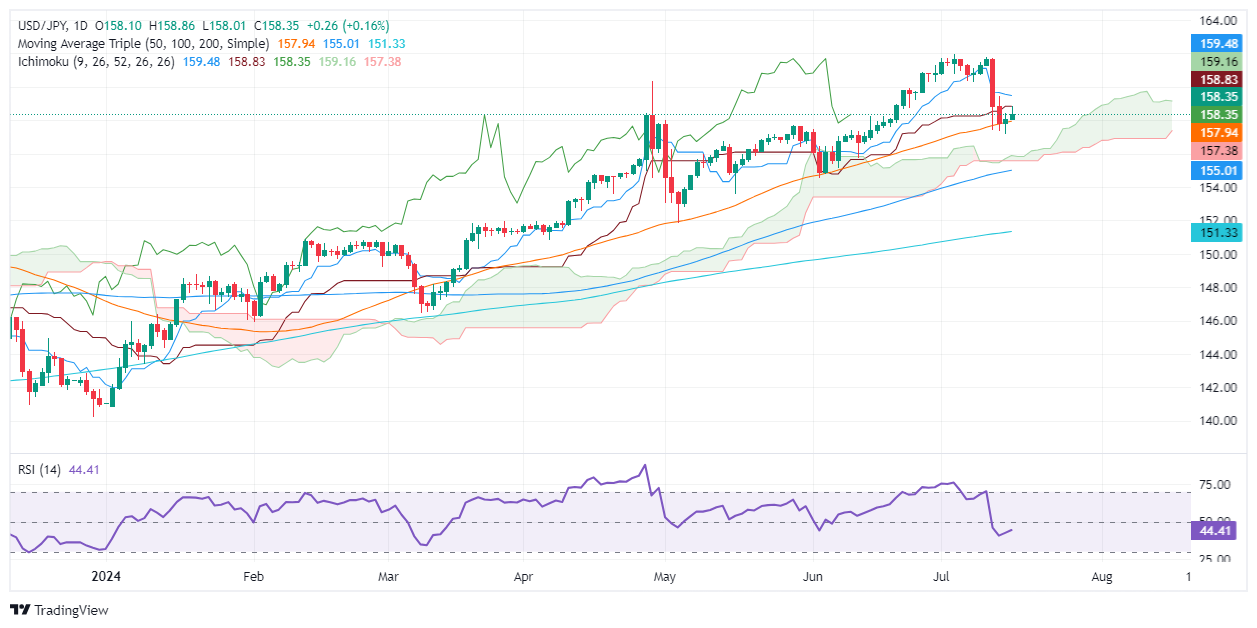- Analytics
- News and Tools
- Market News
- USD/JPY Price Analysis: Struggles to crack 158.50 as bearish signals mount
USD/JPY Price Analysis: Struggles to crack 158.50 as bearish signals mount
- USD/JPY edges higher by 0.24%, trading just below 158.50 during North American session.
- Technical signals turn neutral-bearish with price below Tenkan and Kijun-Sen lines.
- Key levels to watch: support at 158.00 and resistance at 158.50, with further gains toward 160.00 possible.
The USD/JPY edged higher during Tuesday’s North American session, registering minuscule gains of 0.24% and trading below the 158.50 figure. As Wednesday’s Asian session begins, the pair trades at 158.34, virtually unchanged.
USD/JPY Price Analysis: Technical outlook
More technical signals suggest the USD/JPY is turning neutral-bearishly biased, with price diving below the Tenkan and Kijun-Sen, showing the lack of buyers in the market. This is confirmed by the Relative Strength Index (RSI) standing bearish but flat, hinting that neither buyers nor sellers are in charge.
If USD/JPY drops below the 158.00 figure, this would pave the way for a test of the July 15 low of 157.14. Once surpassed, the next stop would be the top of the Ichimoku Cloud (Kumo) at 156.30/50.
On the other hand, if buyers lift USD/JPY’s exchange rate past 158.50, this will expose the Kijun-Sen at 158.84, ahead of the 159.00 mark. Additional gains are seen above the Tenkan-Sen lying at 159.47, on buyers’ way towards the 160.00 mark.
USD/JPY Price Action – Daily Chart
Japanese Yen FAQs
The Japanese Yen (JPY) is one of the world’s most traded currencies. Its value is broadly determined by the performance of the Japanese economy, but more specifically by the Bank of Japan’s policy, the differential between Japanese and US bond yields, or risk sentiment among traders, among other factors.
One of the Bank of Japan’s mandates is currency control, so its moves are key for the Yen. The BoJ has directly intervened in currency markets sometimes, generally to lower the value of the Yen, although it refrains from doing it often due to political concerns of its main trading partners. The current BoJ ultra-loose monetary policy, based on massive stimulus to the economy, has caused the Yen to depreciate against its main currency peers. This process has exacerbated more recently due to an increasing policy divergence between the Bank of Japan and other main central banks, which have opted to increase interest rates sharply to fight decades-high levels of inflation.
The BoJ’s stance of sticking to ultra-loose monetary policy has led to a widening policy divergence with other central banks, particularly with the US Federal Reserve. This supports a widening of the differential between the 10-year US and Japanese bonds, which favors the US Dollar against the Japanese Yen.
The Japanese Yen is often seen as a safe-haven investment. This means that in times of market stress, investors are more likely to put their money in the Japanese currency due to its supposed reliability and stability. Turbulent times are likely to strengthen the Yen’s value against other currencies seen as more risky to invest in.
© 2000-2026. All rights reserved.
This site is managed by Teletrade D.J. LLC 2351 LLC 2022 (Euro House, Richmond Hill Road, Kingstown, VC0100, St. Vincent and the Grenadines).
The information on this website is for informational purposes only and does not constitute any investment advice.
The company does not serve or provide services to customers who are residents of the US, Canada, Iran, The Democratic People's Republic of Korea, Yemen and FATF blacklisted countries.
Making transactions on financial markets with marginal financial instruments opens up wide possibilities and allows investors who are willing to take risks to earn high profits, carrying a potentially high risk of losses at the same time. Therefore you should responsibly approach the issue of choosing the appropriate investment strategy, taking the available resources into account, before starting trading.
Use of the information: full or partial use of materials from this website must always be referenced to TeleTrade as the source of information. Use of the materials on the Internet must be accompanied by a hyperlink to teletrade.org. Automatic import of materials and information from this website is prohibited.
Please contact our PR department if you have any questions or need assistance at pr@teletrade.global.
















